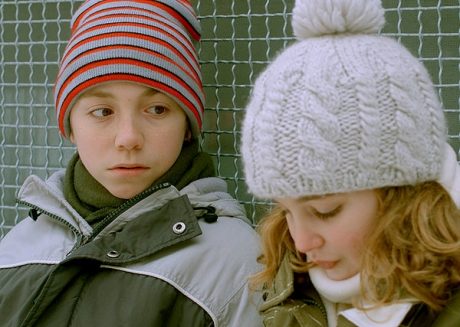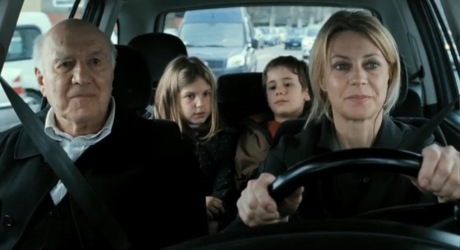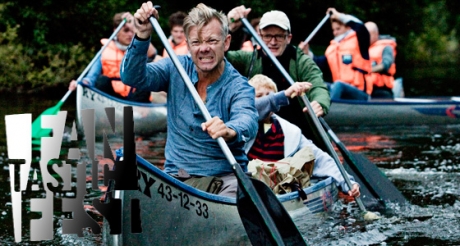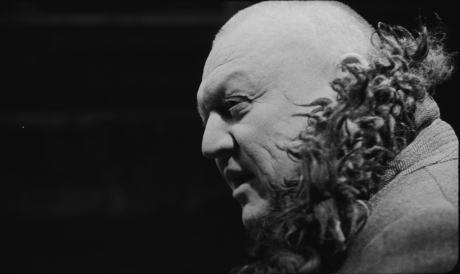It’s no secret that chronic movie going gets a little tedious in the early months of any given year. After the holidays and before the summer, there isn’t much mainstream fare of even moderate quality to balance out the glut of toss-off flicks that Hollywood shovels into theaters between January and March.
But, god bless it, every year Portland’s Northwest Film Center remedies the sad experience of being a professional film buff in February by offering an injection of adrenaline to get me over the hurdle that is covering big movies in the doldrums of the post-holiday months. The injection — formally known as the Portland International Film Festival — draws out for three weeks, a slow-release IV drip of lovingly-crafted foreign movies that, for a time, completely relieves the malaise that comes from reporting on the state of Mark Wahlberg movies.
This year, in deference to the plain fact that no movie playing at PIFF could possibly be anything less than a masterpiece — i.e., foreign, arty, slow, challenging — I’ve come up with a ratings system to lock down each movie’s particular degree of masterpiece-ness. Therefore, a truly great movie will be placed in the category Timeless Masterpiece; a very good one will be deemed a Timely Masterpiece; an above-average film will be a Lost Masterpiece; a decent movie, a Poor Man’s Masterpiece; and a shitty movie will be a Shitty Masterpiece. With that in mind, here’s the chunk of this year’s PIFF that I was lucky enough to see.
Timeless Masterpiece

Monsieur Lazhar, by Canadian Philippe Falardeau, took the cake for me this year. It’s a deceptively simple film about a mysterious, mild-mannered Algerian man (playwright Mohamed Fellag) who brazenly applies for – and receives – a job teaching a class of sixth graders at a Canadian elementary school after something awful (I can’t bring myself to reveal what) happens to their usual teacher. There’s a full-length TMT review forthcoming through which I’ll expand, but for now: Lazhar is simply the warmest and most acutely emotional movie I’ve seen in a long time.
Timely Masterpieces

Coming in a close second to Monsieur Lazhar is Extraterrestrial, by Spain’s Nacho Vigalondo (Timecrimes) — the most purely entertaining movie to have played in Portland in months. I don’t mean entertaining in a Mission: Impossible – Ghost Protocol sense, but in the sense of what it takes to entertain an intelligent moviegoer. Extraterrestrial is complex and farcical without losing its grip on the emotional weight carried by characters who must make serious decisions (such as what to do when your boyfriend blows up half of your home town). It’s only a matter of time before it receives a small theatrical run in Portland and is ushered into the pantheon of modern European cult classics, along with the rest of Vigalondo’s work. In essence, Extraterrestrial asks the question: To what extent would human beings make complete assholes of themselves in the event of an alien invasion? It answers this question by focusing on the bumbling human reaction to an invasion, and it does so with so much wit that for long periods you forget about the city-sized saucer hovering above the characters like the world’s most foreboding raincloud. Vigalondo isn’t quite a Preston Sturges/Charlie Kaufman-level cinematic trickster, but it’s very tempting to call Extraterrestrial the best science-fiction comedy since Being John Malkovich.
Frenchman Michel Ocelot’s Tales of the Night is clearly the work of an animator who has been honing his particular style for a lifetime. Visually, Tales is like Lotte Reiniger mixed with Len Lye (if you like references to classic animation), with a bit of Chuck Jones’s wry sense of humor mixed in. It takes the form of six parables, because Ocelot is a folklore buff who enjoys writing and animating his own versions of classic myths. All center around the basic arc of a young man finding his place in the world by performing some act of derring-do that is uniquely suited to a talent he didn’t realize he even had. The style is jet-black silhouettes of human figures (Reiniger) set against blazingly colorful and complicated backgrounds (Lye) while the dialogue, from characters ostensibly born in ancient, exotic locations, is modern tongue-in-cheek.
Lost Masterpieces

Elena, from Russia’s Andrei Zvyagintsev, is best seen as strong, slow-boil domestic psychology stuff; very well handled, but it doesn’t have much on 2004’s The Return, the only other Zvyagintsev film I’ve seen. The director is a cool chronicler of the modern Russian mindstate – its post-perestroika old-Russia/new-Russia class and family rifts. But he executed his theme so expertly in The Return (which I loved even though I saw it on a computer) that it feels like a retread in his new film. Elena’s title character is an aging nurse who married one of her wealthiest patients, and, as the movie opens, is living in his luxury condo, taking care of him on a far more personal level than she could have as a nurse. We discover Elena comes from a poor/lower middle-class Russian background – she travels all day to get to the Moscow tenement house where her layabout son lives with his wife and child in a cramped apartment overlooking a nuclear power plant. She gives her son money she has skimmed from her husband (the husband seems to be some kind of investment banker, but it’s never made clear), but the more the son receives, the more he tries to squeeze out of his mother’s newfound wealth. The husband finds out and is none too pleased, which puts Elena in the position of having to choose between the fidelity she owes her successful, supercilious husband, and the commitment she’s made to her son, who after all is not at fault for having been born poor. Zvyagintsev has concocted a value paradox for Elena, one that seems to be the crux of modern Russia: caught between lingering communism and burgeoning capitalism, trying to create a balance between the worlds, what is a Russian supposed to do with money she’s not used to? The messaging is often heavy-handed (the aforementioned nuke plant that looms over the poor), but Zvyagintsev has an extraordinary eye for detail and a feel for the pace of everyday drudgery. Elena is satisfying as a precise snapshot of domestic stasis, unconvincing as a social critique.
Where Do We Go Now? from Lebanon’s resident auteurette, Nadine Labaki, has much more warmth of feeling for its characters and their culture than does Elena (the movies are similar in a few unseen ways), but its decision to switch frequently between Amarcord-esque comedy and Things Fall Apart-style community dissolution makes the whole thing feel just as forced. In a Lebanese village wherein most of the men have been killed, presumably fighting for or against Hezbollah, a microcosm of the country’s religious struggle is played out between the surviving menfolk, who bullishly divide themselves between Christians and Muslims. The solution to the dissolution comes in the form of a pro-Facist allegory: the village women stave off a confrontation between the men by constantly tricking them into becoming friends. It’s as if Lady MacBeth were multiplied by six and changed her goal from driving men towards violence to keeping them away from it. Where Do We Go Now? is all-in-all a happy experience, not a bad thing for a movie, but that doesn’t make its plea for religious tolerance stick.
Bullhead, which continues the motif of unsuccessfully mashed-up themes, is an attempt to forge a brooding character study out of a labyrinthine crime plot. It aims to puncture the manhood of a load of Flemish gangsters who specialize in illegally injecting commercial cattle with growth hormones. One gangster, Jacky, a man addicted to steroids himself – and thus equated with the cows and bulls he deals in – is the film’s main focus. Check out my full review here, or just take my word for it: Bullhead is worth watching if you can handle a movie that trades in its heart for a jolt of excitement, then trades back.
Poor Man’s Masterpiece

In Habemus Papam (translation: We Have a Pope) Michel Piccoli, one of France’s greatest actors, turns in a twilight role as an Italian, a Catholic Cardinal called to Rome along with the rest of the world’s Cardinals for the selection of the Pope. Piccoli’s Cardinal scores an unexpected win, but suffers a nervous breakdown shortly after it sinks in that he’s become the world’s most important religious figure. The bulk of the movie follows him as he wanders around Rome like Princess Yang Kwei-Fei, an unknown leader blending in with his subjects. Meanwhile, the atheist psychologist brought to the Vatican to treat the new Pope (played by director Nanni Morreti) tries to keep the waiting Cardinals busy with a volleyball tournament. Piccoli’s terrifically sympathetic performance rubs off on the general staleness of this half-realized film, until the movie itself starts to resemble his weathered face.
Café de Flore is a comfortingly sensual look at lost love and the persistence of loyalty, from French-Canadian Jean-Marc Vallee (The Young Victoria), a director who has been to America but shows here that home is where he belongs. Its story, which Vallee — through his use of voice-over, lingering shots of beautiful bodies, and reliance on have-it-out dialogue scenes — insists that we take seriously, is about a handsome professional DJ with a gorgeous young wife and an even more gorgeous ex-wife, both of whom are in love with him. His life is put to us as ostensibly perfect, but he can’t shake the feeling that his ex may have been his soul mate, and that he may have seriously fucked up by leaving her. Meanwhile, the movie keeps pointedly flashing us back to 1969, where a working mother – who not coincidentally resembles the ex-wife from the modern-day section – is raising a son with Down syndrome. The link between the two stories, which play off of one another jarringly, seems to be that the Down boy has been somehow reincarnated as the DJ, to be cared for again by the ex-wife/mother. The reincarnation bit doesn’t work, but Vallee is an electric filmmaker, enormously in tune to the sense experience of his characters.
Shitty Masterpiece

In 1998, Stanley Kauffman wrote about There’s Something About Mary: “It’s as if the writers began by making a list… What are the subjects about which one is not permitted to joke? Then they proceed to make jokes about them.”
Kauffmann, a tough but uncommonly perceptive critic, went on to review the Farrelly brothers movie favorably. Last week, when I saw Denmark’s Clown: The Movie at the film festival about which I’m writing, the same thought occurred to me about its makers: that their idea of screenwriting must be to sit down, compile a list of taboos, then try to break them. I didn’t realize at the time that Kauffmann had already made this observation 14 years ago, and about a better movie. The fact that he did, and that There’s Something About Mary is a good comedy, is enough to condemn Clown: The Movie. Not only is this film by Danish comedians Frank Hvam and Casper Christensen (based on their sitcom) a retread of the supposed taboo-smashing practiced by Americans in the 1990s, it’s an unbearably witless one. Where Mary hung its gross-out gags on the pegs of suffering, relatable characters, Clown offers up two assholes (Hvam and Christensen) with paper-thin personalities who proceed to cum on the face of an old lady, rape a teenage girl, and photograph themselves fondling a young boy – prompting the audience to squirm, then laugh, then marvel at their lack of ingenuity. The story into which they’ve plunked these jokes is quite obviously the same as the one from Sideways, about a pre-wedding bachelor’s getaway that turns disastrous, but comparison to the subtlety of Alexander Payne is something these Danish morons don’t begin to deserve.
Unknown Masterpieces (Movies I Hope Get Distribution)

The new Béla Tarr film, The Turin Horse, seems like an unmitigated masterpiece for real, not in the sense of my irony-laden hierarchy.
The Kid with a Bike, from those excellent old masters, the Dardennes brothers, looks like yet another of their winners. The trailer made me tear up.
Once Upon a Time in Anatolia emerges from the creative spark of young Turk Nuri Bilge Ceylan, whose films are simply never to be missed.
Snowtown (aka The Snowtown Murders), from Australia’s Justin Kurzel is about a serial-killing case I’ve read quite a bit about, so even aside from its creepy, kickass trailer, I’ve got to see it.
Norwegian Wood, by the inimitable French-Vietnamese director Tran Anh Hung, adapted from the novel by Haruki Murakami, that trendy writer I still haven’t gotten around to reading. Hung is one of the new world masters.
